Waiting for us at Palmerston Station yesterday after our first train trip of the day was a mini bus to take us on the our gold mine tour. But first we stopped at the historic Dunback Hotel for lunch. This interesting old building was built in 1862 and like a lot of country pubs these days, is finding that times are tough. “Mine Host” told us that he runs the pub by himself and the only staff member he employs is the cook. Dunback wasn’t always such a quiet, sleepy little place. Back in the late 1800s a cannery plant employed 30 men to process 2000 rabbits a day. A further 30 men were employed in trapping to keep the cannery supplied.
The meal was part of the cost of our “Railway to Gold Tour”, and we enjoyed chicken breast wrapped in filo pastry, followed by pavlova and fruit for dessert, served in the vintage dining room.
Lunch over, we boarded the mini bus again and drove up to Oceana Gold Mine at Macraes Flat. A short film gave us an overview of the processes involved to extract the gold, then we went on to view the open cast mine. The mine below us was gigantic, and no one was prepared for how big it actually was. We were told it is five times bigger than New Zealand’s other open cast mine in Waihi. There is also an underground mine, and both mines operate continuously, 24 hours a day and 7 days a week..
Huge Caterpillar dump trucks (costing $2 million each) drive to and fro picking up 190 tonnes of rock at a time. The trucks are equipped with GPS and 2 way radios so their whereabouts are continuously monitored. Each truckload of rock only yields 2 teaspoons of gold, extracted after crushing the rock and using convoluted chemical .processes. The total daily pour is one gold block each day, worth a staggering $1 million, which is sold on the open market.
The heavy maintenance workshop is kept busy each day maintaining not only the trucks, but excavators, and the myriad of other machinery on site. Female truck drivers are much gentler on their trucks we were told than the macho gung-ho men. The explosives used are also made on site, in 50 ton batches, and as expected, this building was off limits to visitors and tour groups. The land must be rehabilitated and returned to as it was. Accordingly, waste spoil is dumped in huge hills, covered in soil, planted with grass and returned to pasture. Oceana are also involved in a trout hatchery, a co-operative project with Fish and Game NZ and the local community. On entering the hatchery, our nostrils were hit with a very strong fishy smell, not surprising really as the young fish were kept in tanks indoor. The larger fish are in outside tanks and are released when they reach a foot in length. The water boiled and the fish jumped frantically to the surface when our guide tossed a handful of fish food into the tanks.
Gold mining in this area all started when prospectors found alluvial gold in the streams. This was soon picked over and then the hard work of digging with pick and shovel and putting the rock through a stamper went on for many years. The Huntington Mill still stands from these early days.
Our second old pub of the day was Stanley’s Hotel (built in 1882) at Macreas Flat, currently undergoing restoration. The rain had been falling all day, but a cosy fire was burning in the dining room and we enjoyed hot savouries and cream lamingtons together with a nice cuppa. That certainly chased the chills away. There were trophy heads adorning the walls, pigs and deer.
 Stanley’s Hotel, covered in scaffolding
Stanley’s Hotel, covered in scaffolding
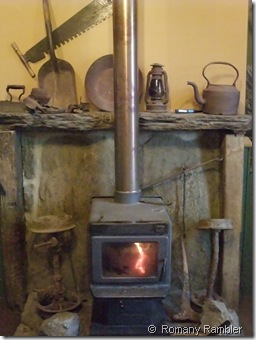 Cosy fire and old implements on display
Cosy fire and old implements on display
It was time to board the mini bus once more and our driver took us back to Pukerangi to meet our second train of the day, the Taieri Gorge Railway. But not before he had passed a gold coin around the bus for us to check out. He certainly made sure the $4000 coin was safely back in his keeping before he let us off the bus.
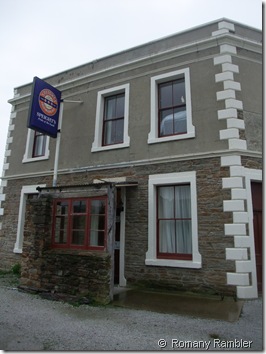
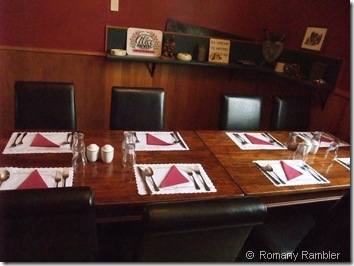
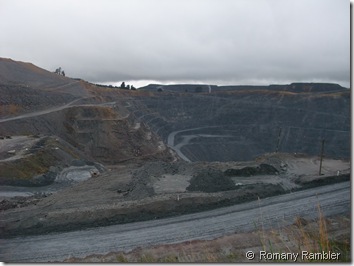
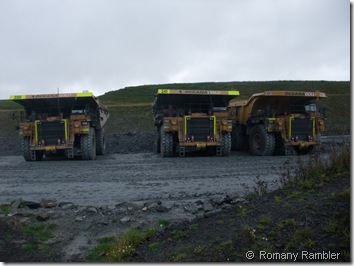
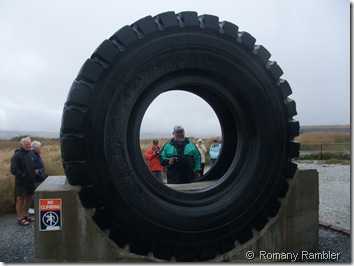
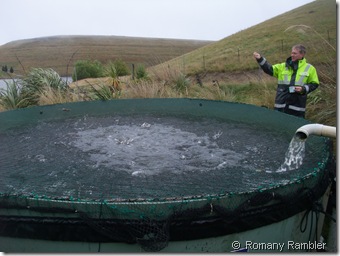
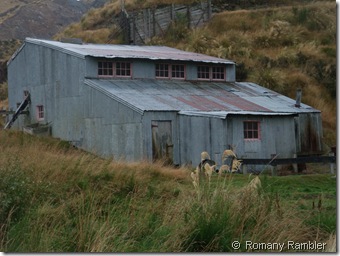

No comments:
Post a Comment